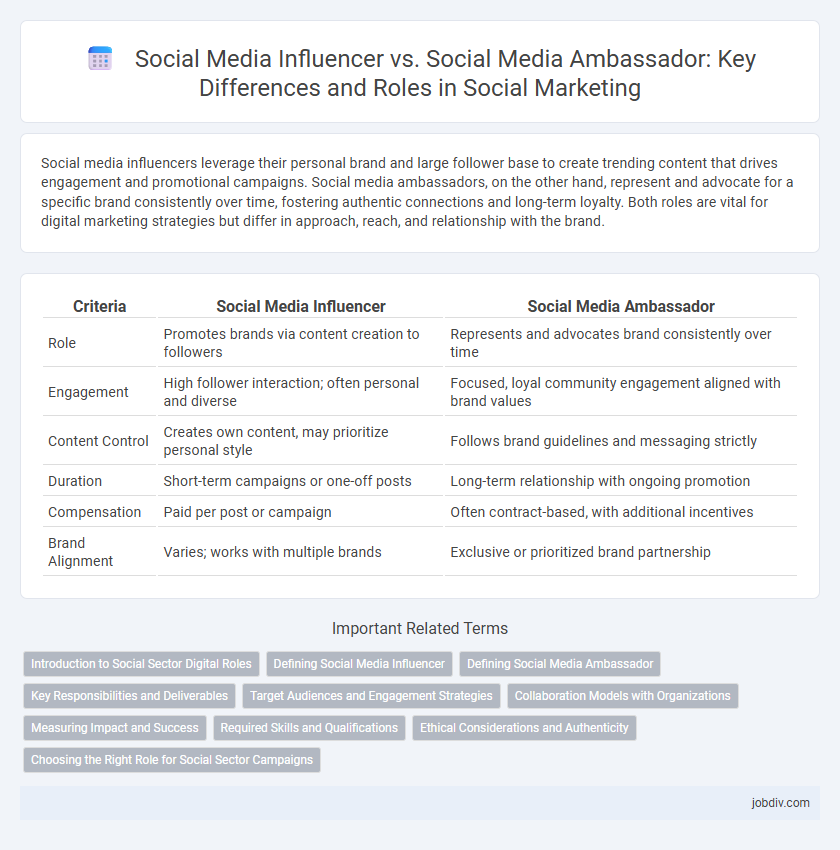Social media influencers leverage their personal brand and large follower base to create trending content that drives engagement and promotional campaigns. Social media ambassadors, on the other hand, represent and advocate for a specific brand consistently over time, fostering authentic connections and long-term loyalty. Both roles are vital for digital marketing strategies but differ in approach, reach, and relationship with the brand.
Table of Comparison
| Criteria | Social Media Influencer | Social Media Ambassador |
|---|---|---|
| Role | Promotes brands via content creation to followers | Represents and advocates brand consistently over time |
| Engagement | High follower interaction; often personal and diverse | Focused, loyal community engagement aligned with brand values |
| Content Control | Creates own content, may prioritize personal style | Follows brand guidelines and messaging strictly |
| Duration | Short-term campaigns or one-off posts | Long-term relationship with ongoing promotion |
| Compensation | Paid per post or campaign | Often contract-based, with additional incentives |
| Brand Alignment | Varies; works with multiple brands | Exclusive or prioritized brand partnership |
Introduction to Social Sector Digital Roles
Social media influencers leverage personal branding and large follower bases to drive engagement and promote products or causes, often focusing on entertainment and lifestyle content. Social media ambassadors represent organizations or social causes, using strategic messaging and authentic advocacy to build trust and foster community support online. Both roles are crucial in the digital social sector for shaping public opinion and enhancing social impact campaigns.
Defining Social Media Influencer
A social media influencer is an individual who has built a substantial following by consistently sharing engaging content that resonates with specific audience demographics, leveraging their credibility to affect purchasing decisions. Influencers often specialize in niche markets such as fashion, fitness, or technology, utilizing platforms like Instagram, TikTok, or YouTube to amplify their reach. Their authentic interaction and established trust with followers distinguish them from social media ambassadors, who primarily represent and promote a brand's image in a more formal capacity.
Defining Social Media Ambassador
A Social Media Ambassador is a brand advocate who consistently promotes and represents a company's values and products authentically on their personal social media platforms over an extended period. Unlike influencers who often engage in one-off sponsored posts, ambassadors build deeper connections with the audience by creating genuine, ongoing content that aligns with the brand's mission. Their role emphasizes long-term collaboration and trust-building, driving brand loyalty and sustained engagement.
Key Responsibilities and Deliverables
Social media influencers primarily focus on creating engaging content to promote brands authentically to their followers, while social media ambassadors represent and support a brand consistently over time through ongoing promotion and customer interaction. Influencers deliver sponsored posts, product reviews, and viral campaigns, whereas ambassadors provide continuous brand advocacy, attend events, and offer direct feedback to the company. Both roles require strong audience engagement, but ambassadors often have longer-term partnerships with deeper brand alignment and measurable impact on customer loyalty.
Target Audiences and Engagement Strategies
Social media influencers primarily target niche audiences with high follower engagement through personal storytelling and authentic content, often leveraging trends to drive immediate reactions. Social media ambassadors focus on brand-loyal communities by consistently sharing brand values and creating long-term relationships, enhancing trust and credibility. Engagement strategies for influencers emphasize viral reach and rapid interaction, while ambassadors prioritize sustained interaction and deep audience connections.
Collaboration Models with Organizations
Social media influencers typically engage in short-term partnerships with organizations, leveraging their personal brand to create sponsored content aimed at broad audience reach and immediate impact. In contrast, social media ambassadors establish long-term collaborations, embodying the organization's values and consistently promoting its mission through authentic and ongoing content creation. Both models drive engagement but differ in depth of relationship and brand integration.
Measuring Impact and Success
Measuring impact for social media influencers primarily involves tracking engagement metrics such as likes, shares, comments, and follower growth, which directly reflect audience interaction and reach. Social media ambassadors focus on long-term brand alignment, using metrics like brand sentiment analysis, conversion rates, and customer loyalty to gauge success. Both roles rely on data analytics tools but differ in the emphasis on short-term viral impact versus sustained brand advocacy.
Required Skills and Qualifications
Social media influencers require strong content creation skills, audience engagement expertise, and a deep understanding of platform algorithms to build authentic followers. Social media ambassadors must possess excellent brand alignment knowledge, communication skills, and the ability to represent companies consistently across multiple channels. Both roles demand proficiency in analytics tools and trend awareness to maximize impact and maintain relevance.
Ethical Considerations and Authenticity
Social media influencers often face scrutiny over transparency and authenticity, as their content is frequently sponsored and may prioritize brand promotion over genuine engagement. Social media ambassadors typically maintain stronger ethical standards by aligning with brands they truly believe in, fostering long-term trust and credibility with their audience. Authenticity in social media marketing hinges on clear disclosure of partnerships and consistent, honest communication to uphold ethical integrity.
Choosing the Right Role for Social Sector Campaigns
Social media influencers typically offer broad reach and high engagement through authentic, personal content, making them ideal for awareness-driven campaigns in the social sector. Social media ambassadors maintain long-term commitment and brand alignment, providing sustained advocacy and deeper trust with targeted communities. Selecting the right role depends on campaign goals: influencers drive rapid visibility, while ambassadors build lasting relationships and credibility.
Social Media Influencer vs Social Media Ambassador Infographic

 jobdiv.com
jobdiv.com